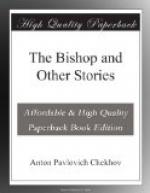“Yes,” answered my companion, and he wagged his head, “I have been here for three weeks. And you know, every day services, every day services. On ordinary days at midnight they ring for matins, at five o’clock for early mass, at nine o’clock for late mass. Sleep is utterly out of the question. In the daytime there are hymns of praise, special prayers, vespers. . . . And when I was preparing for the sacrament I was simply dropping from exhaustion.” He sighed and went on: “And it’s awkward not to go to church. . . . The monks give one a room, feed one, and, you know, one is ashamed not to go. One wouldn’t mind standing it for a day or two, perhaps, but three weeks is too much—much too much I Are you here for long?”
“I am going to-morrow evening.”
“But I am staying another fortnight.”
“But I thought it was not the rule to stay for so long here?” I said.
“Yes, that’s true: if anyone stays too long, sponging on the monks, he is asked to go. Judge for yourself, if the proletariat were allowed to stay on here as long as they liked there would never be a room vacant, and they would eat up the whole monastery. That’s true. But the monks make an exception for me, and I hope they won’t turn me out for some time. You know I am a convert.”
“You mean?”
“I am a Jew baptized. . . . Only lately I have embraced orthodoxy.”
Now I understood what I had before been utterly unable to understand from his face: his thick lips, and his way of twitching up the right corner of his mouth and his right eyebrow, when he was talking, and that peculiar oily brilliance of his eyes which is only found in Jews. I understood, too, his phraseology. . . . From further conversation I learned that his name was Alexandr Ivanitch, and had in the past been Isaac, that he was a native of the Mogilev province, and that he had come to the Holy Mountains from Novotcherkassk, where he had adopted the orthodox faith.
Having finished his sausage, Alexandr Ivanitch got up, and, raising his right eyebrow, said his prayer before the ikon. The eyebrow remained up when he sat down again on the little sofa and began giving me a brief account of his long biography.
“From early childhood I cherished a love for learning,” he began in a tone which suggested he was not speaking of himself, but of some great man of the past. “My parents were poor Hebrews; they exist by buying and selling in a small way; they live like beggars, you know, in filth. In fact, all the people there are poor and superstitious; they don’t like education, because education, very naturally, turns a man away from religion. . . . They are fearful fanatics. . . . Nothing would induce my parents to let me be educated, and they wanted me to take to trade, too, and to know nothing but the Talmud. . . . But you will agree, it is not everyone who can spend his whole life struggling for a crust of bread, wallowing in filth, and mumbling




